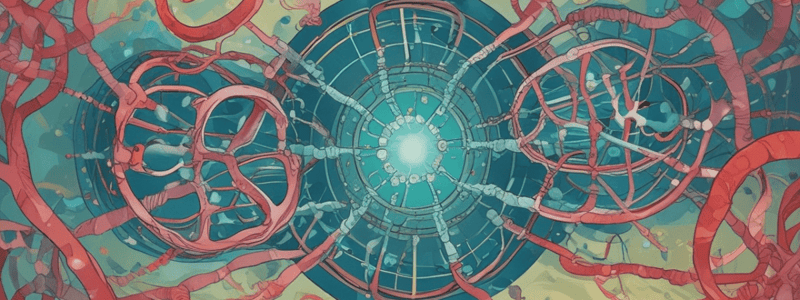Podcast
Questions and Answers
What is the term for one of a pair of genes that occupy the same location on homologous chromosomes and affect the same trait in animals?
What is the term for one of a pair of genes that occupy the same location on homologous chromosomes and affect the same trait in animals?
- Cytoplasm
- Chromatin
- Allele (correct)
- Nucleus
Which term refers to the number of chromosomes in a sex cell, being half of the original number?
Which term refers to the number of chromosomes in a sex cell, being half of the original number?
- Mitosis
- Haploid (correct)
- Meiosis
- Diploid
What process results in cell division of the nucleus of a somatic cell, leading to two identical daughter nuclei in two cells?
What process results in cell division of the nucleus of a somatic cell, leading to two identical daughter nuclei in two cells?
- Oogenesis
- Mitosis (correct)
- Meiosis
- Spermatogenesis
Which term describes the essential part of a cell that contains nuclear sap and is the source of chromosomes?
Which term describes the essential part of a cell that contains nuclear sap and is the source of chromosomes?
What is the proportion of observed variation in a trait that can be inherited due to genetic factors called?
What is the proportion of observed variation in a trait that can be inherited due to genetic factors called?
Which term is used to describe the division of a cell resulting in haploid cells?
Which term is used to describe the division of a cell resulting in haploid cells?
What refers to a male reproductive cell?
What refers to a male reproductive cell?
Which term describes a female chromosome?
Which term describes a female chromosome?
Homologous means:
Homologous means:
What is the term for the sum of qualities genetically derived from one's parents?
What is the term for the sum of qualities genetically derived from one's parents?
Which term describes the process that brings about differences and similarities between parents and offspring?
Which term describes the process that brings about differences and similarities between parents and offspring?
What is the term for the male or female reproductive cells?
What is the term for the male or female reproductive cells?
What refers to paired chromosomes in body cells?
What refers to paired chromosomes in body cells?
Which term describes meiosis in females?
Which term describes meiosis in females?
What is referred to as one of a pair of genes that occupy the same location on homologous chromosomes and affect the same trait in animals?
What is referred to as one of a pair of genes that occupy the same location on homologous chromosomes and affect the same trait in animals?
What is the complex solution of organic and inorganic components outside the cell nucleus contained by a cell membrane called?
What is the complex solution of organic and inorganic components outside the cell nucleus contained by a cell membrane called?
What is the proportion of observed variation in a particular trait which can be inherited due to genetic factors?
What is the proportion of observed variation in a particular trait which can be inherited due to genetic factors?
Which term refers to the number of chromosomes in a sex cell which is half of the original number?
Which term refers to the number of chromosomes in a sex cell which is half of the original number?
Flashcards are hidden until you start studying
Study Notes
Genetics and Heredity
- Genetics is the science of heredity and variation, studying the differences and similarities between parents and offspring.
- Heredity is the process that brings about these differences and similarities, resulting in the sum of qualities genetically derived from one's parents.
Vocabulary
- Allele: one of a pair of genes that occupy the same location on homologous chromosomes, affecting the same trait in animals.
- Cytoplasm: a complex solution of organic and inorganic components outside the cell nucleus, contained by a cell membrane.
- Diploid: refers to paired chromosomes in body cells.
- Gametes: male or female reproductive cells.
- Genes: the smallest unit of inheritance, a portion of a DNA molecule that occurs in pairs on chromosomes in the nucleus of every cell.
- Haploid: refers to the number of chromosomes in a sex cell, which is half of the original number.
- Heritability: the proportion of observed variation in a particular trait that can be inherited due to genetic factors.
- Nucleus: essential to cell functions, containing nuclear sap, and the source of chromosomes.
- Chromatin: forms colored bodies.
Cell Division and Reproduction
- Meiosis: cell division resulting in haploid cells.
- Mitosis: cell division of the nucleus of a somatic cell, resulting in two identical daughter nuclei in two cells.
- Oogenesis: meiosis in females.
- Spermatogenesis: meiosis in males.
Chromosomes
- X Chromosome: a female chromosome.
- Y Chromosome: a male chromosome.
Studying That Suits You
Use AI to generate personalized quizzes and flashcards to suit your learning preferences.




